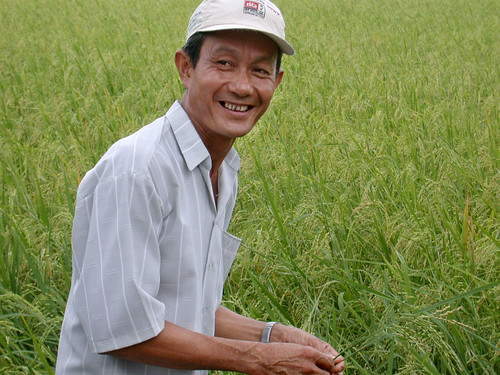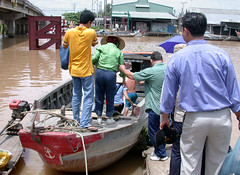
Tu Man, above, has been having good rice harvests, making him a middle-class, head-of-the-household in Vietnam. The average worker in Vietnam is lucky to earn the equivalent of $40 U.S. dollars a month. Tu Man is smiling, too, for impressing his neighbors, by having American visitors.
ALONG THE MEKONG DELTA, Vietnam – The rice boat's engine sputters, stalls and spouts thick, smelly black oil on its passengers.
They wipe themselves down with newspapers and rags while its engine cranks and churns back to life, pushing the boat again down the Mekong Delta.
The weathered gray wooden boat is not carrying its normal haul of rice weighing 10 tons. It is parading two Americans on a sweltering mid-July afternoon along the muddy brown delta the Vietnamese call Cuu Long, or River of Nine Dragons.
Vietnam veteran Neal Armagost of Reynoldsville is aboard with his wife, Thanh, a Vietnamese immigrant to Pennsylvania, en route to give a rice farmer photographs of his newborn granddaughter in the United States. An American newspaper reporter is at their side, invited by Thanh Armagost to glimpse the life of an average hard-working farm family in Vietnam.

Onlookers, many of whom have probably never seen Americans, smile and stare from thatched huts on stilts lining the riverbank and passing boats hauling exotic fruits.
Children splash at the river's edge while a group of women stoop to wash clothes.
"The water is poison," a young man named Hieu said, blaming the pollution on runoff from rice paddies that have been sprayed too often with pesticides.
Downstream, the farmer's family is preparing a feast that is costing it about $40, the monthly salary earned by most workers in Vietnam.
The boat anchors at a small plank dock after navigating under a narrow bamboo monkey bridge villagers built to cross the river.
Everyone follows a path covered with terra-cotta shards leading to the rice farmer's home, passing well-manicured papaya and mango orchards. A barefoot boy uses his hands and feet to shimmy to the top of a palm tree to retrieve a dozen coconuts to serve the fruit's cool, refreshing milk.
Inside the four-room, one-story white stucco house, a woman drains blood from the neck of a red-feathered chicken that will become dinner.
The menu also includes rice noodle soup with pork and beef, seafood rolls, fresh-baked bread and banh xeo, or Vietnamese pancakes.
Thanh Armagost passes around photographs of 5-month-old Loan Thy Vu, the daughter of her nephew, whom she raised. The baby's mother, who also lives with the Armagosts, is a daughter of the rice farmer, Tu Man.
"I miss her already," said Ba Noi, the grandmother on the father's side of the family. The wrinkles on the 88-year-old woman's tanned face testify to the hours she spends under the sun tending to the vegetables, two-thirds of which are sold to sustain the family.After dinner, Tu Man beams while leading his visitors to his paddies, showing them how he toils in fields, hand-harvesting each stalk of rice. The men return to the head table to share bottles of Saigon beer.
"I respect the American soldiers," said Tu Man, whose youthful appearance helped him avoid serving in the South Vietnam army three decades ago.
He later lines up his family on the front porch in view of the Americans' cameras for a group photograph, a special occasion in this village without such conveniences as telephones.
It is time to return to port, where the farmer leaves his visitors with hugs and kisses on their cheeks.

No comments:
Post a Comment